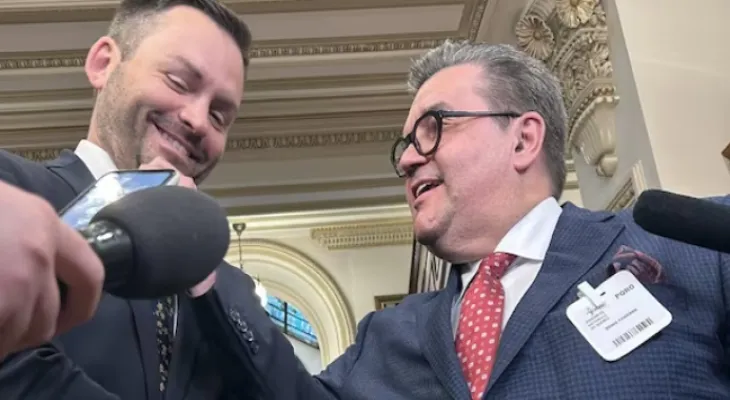Search here
Newspaper
Search here

Arab Canada News
News

Published: February 15, 2024
The rise of the Quebec Party (PQ) sovereigntist in voting intentions in the province of Quebec is what prompts Denis Coderre to seriously consider running for the leadership of the Quebec Liberal Party (PLQ), as the former mayor of Montreal explained today during a visit to the National Assembly (Legislative Assembly) of the province of Quebec.
"This is why I am thinking about returning (to political life)," Coderre told reporters gathered around him in the lobby of the National Assembly.
Coderre is particularly concerned that the leader of the Quebec Party, Paul Saint-Pierre Plamondon, has committed, if his party wins the next general legislative election in Quebec in the fall of 2026, to presenting a bill aiming to hold a general referendum on the independence of the province of Quebec from the Canadian federation.
"This means that in the next elections, it will be (a confrontation) between federalist supporters and supporters of separation, and that is clear," Coderre said, emphasizing that the Quebec Liberal Party is "the only federalist party in Quebec."
Even though the Minister of the French Language in the government of the Coalition Avenir Québec (CAQ), Jean-François Roberge, recently announced that he would oppose Quebec independence in the event of a general referendum on the subject after 2026, Coderre doubts that all members of the ruling party in the province think the same way.
"I look forward to hearing Bernard Drainville say that he will protect Quebec within Canada," Coderre added in this regard.
Drainville is currently the Minister of Education in the government of the Coalition Avenir Québec led by François Legault, and was Minister of Democratic Institutions and Citizen Participation in the Quebec Party government between 2012 and 2014.
Today, Coderre announced the launch of the movement "No, Thanks," that is, "No" to Quebec's independence from the Canadian federation, inspired by the name of the "No, Thanks... It Can Be Said Well" campaign launched by the federal government in response to the first general referendum campaign on Quebec sovereignty in 1980 when the historic leader of the Quebec Party, René Lévesque, was in power in Quebec.
Coderre is an experienced politician who was a Member of Parliament under the banner of the Canadian Liberal Party (LPC) from June 1997 to June 2013. He held several ministerial positions in the governments of Jean Chrétien and Paul Martin, including Minister of Citizenship, Immigration and Multiculturalism. He resigned from his parliamentary seat in June 2013 to run for mayor of Montreal, the largest city in the province of Quebec and the second largest city in Canada, and won the position (2013 - 2017).
At a press conference held this morning, the leader of the Quebec Party accused the former federal minister of launching a "fear campaign" against the Quebec sovereignty project, adding that he is "surprised by the freezing of the federalist argument to this extent," compared to where it was in the 1970s and 1980s.
"We will monitor the matter closely," added Saint-Pierre Plamondon, especially since Coderre will "most likely" be the next leader of the Quebec Liberal Party, making him "the co-leader of the opposition (to Quebec sovereignty) along with François Legault" if a new referendum on sovereignty is held after the 2026 elections.
This is a criticism from the leader of the Quebec Party towards Legault who, like Drainville, was previously a member and minister under the banner of the Quebec Party.
For his part, the leader of the parliamentary bloc of the Quebec Liberal Party, Monsef Derraji, refused to comment on Coderre’s statements today, noting that by virtue of his position, he is not allowed to intervene in the upcoming leadership election race.
Coderre was not invited to attend the meeting of the Liberal Party members today, but he noted that Liberal members came to greet him upon his arrival at the Legislative Assembly building.
Among those who came to greet Coderre was also the leader of the Quebec Party, Paul Saint-Pierre Plamondon.
Comments